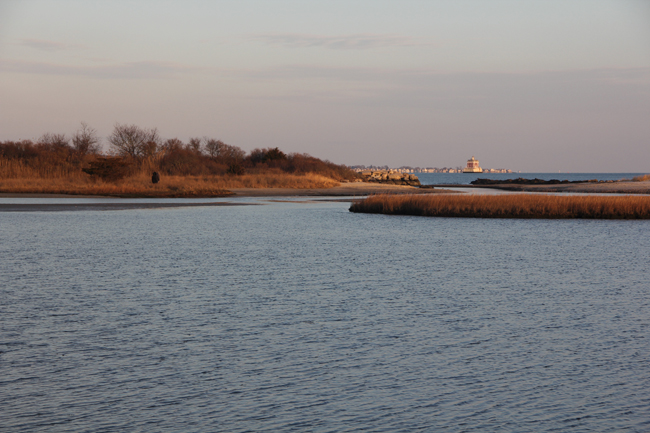
Long Island Sound’s embayments like Alewife Cove in New London, CT will be the subject of one of the eight research projects. Credit: Judy Benson / Connecticut Sea Grant
— Published by The Day
New London, CT, February 24, 2021 - A competitive research grant program has chosen eight projects that will study the water quality and other aspects of the Long Island Sound.
The program, Long Island Sound Study, is funded by federal and state dollars through a joint effort from the U.S. Environmental Protection Agency, Connecticut Sea Grant and New York Sea Grant. The total cost of the eight projects is $2.8 million. Researchers from the University of Connecticut, the state Department of Energy and Environmental Protection and other entities “will attempt to answer questions critical to advancing restoration of the estuary and its watershed,” a press release from the Long Island Sound Study reads.
“The Long Island Sound Study is a cooperative effort sponsored by the Environmental Protection Agency and the states of Connecticut and New York to restore and protect the Sound and its ecosystems,” the press release reads. “The restoration work is guided by a Comprehensive Conservation and Management Plan under four themes: Clean Waters and Healthy Watersheds; Thriving Habitats and Abundant Wildlife; Sustainable and Resilient Communities; and Sound Science and Management.”
Projects will look at how historical land use practices impact nitrogen management, marsh rebuilding, alewife migration, how marine life can help measure and remove pollutants, eelgrass recovery and water conditions, among other topics.
“This research competition resulted in an interesting diversity of projects,” Connecticut Sea Grant Director Sylvain De Guise said in the release. “These include novel approaches to understanding and managing Long Island Sound and reaching the goals of increased water quality that support productive ecosystems for the benefit of wildlife and humans. In my opinion, it is a very smart investment for long-term benefits.”
EPA region 2 Acting Regional Administrator Walter Mugan commented on those possible long-term benefits.
“More than 10 percent of Americans live within 50 miles of the Long Island Sound’s shores, where issues like nitrogen pollution threaten water quality, marine life and coastal resiliency,” he said in the release. “These projects reflect EPA’s longstanding commitment to developing solutions to protect and restore the Sound to healthy waters, benefitting surrounding communities environmentally, economically and recreationally.”
More Info: Long Island Sound Study
Long Island Sound is one of the 28 nationally designated estuaries under the National Estuary Program (NEP), which was established by Congress in 1987 to improve the quality of Long Island Sound and other places where rivers meet the sea.
The Long Island Sound Study is a cooperative effort sponsored by the Environmental Protection Agency and the states of Connecticut and New York to restore and protect the Sound and its ecosystems. The restoration work is guided by a Comprehensive Conservation and Management Plan under four themes: Clean Waters and Healthy Watersheds; Thriving Habitats and Abundant Wildlife; Sustainable and Resilient Communities; and Sound Science and Management.
For more on what you can do to make a difference, click over to the "Get Involved" or "Stewardship" sections of the Long Island Sound Study's website. News on the Long Island Sound Study can also be found in New York Sea Grant's related archives.
If you would like to receive Long Island Sound Study's newsletter, please visit their site's homepage and sign up for the "e-news/print newsletter" under the "Stay Connected" box.
More Info: Connecticut Sea Grant
Connecticut Sea Grant (CTSG), located at the UConn Avery Point campus, is a state and federal partnership funded by the National Oceanic and Atmospheric Administration (NOAA) and the University of Connecticut. CTSG, which in 2019 celebrated its 30th anniversary as a Sea Grant College Program, works to achieve thriving coastal and marine ecosystems and communities by supporting local and national research, outreach and education programs. CTSG accomplishes this by providing objective, science-based information to encourage individuals and organizations to make informed decisions, communicating scientific findings in a practical manner helpful to diverse audiences, and helping others balance the use and conservation of coastal ecosystems. Ultimately CTSG’s activities increase the resilience of the coastal communities, economies and ecosystems.
The program has three foci: research, outreach, and education. Outreach efforts include the CTSG Extension Program, and its Communications Program. The program also has an administrative staff committed to promoting understanding of the Sea Grant mission.
For more, visit seagrant.uconn.edu.
More Info: New York Sea Grant
New York Sea Grant (NYSG), a cooperative program of Cornell University
and the State University of New York (SUNY), is one of 34 university-based
programs under the National Oceanic and Atmospheric Administration’s
National Sea Grant College Program.
Since 1971, NYSG has represented a statewide network of integrated
research, education and extension services promoting coastal community
economic vitality, environmental sustainability and citizen awareness
and understanding about the State’s marine and Great Lakes resources.
Through NYSG’s efforts, the combined talents of university scientists
and extension specialists help develop and transfer science-based
information to many coastal user groups—businesses and industries,
federal, state and local government decision-makers and agency managers,
educators, the media and the interested public.
The program maintains Great Lakes offices at Cornell University, University at Buffalo, SUNY Oswego and the Wayne County Cooperative Extension office
in Newark. In the State's marine waters, NYSG has offices at Stony Brook
University in Long Island, Brooklyn College and Cornell Cooperative
Extension in NYC and Elmsford and Kingston in the Hudson Valley.
For updates on Sea Grant activities: www.nyseagrant.org has RSS, Facebook, Twitter, Instagram, and YouTube links. NYSG offers a free e-list sign up via www.nyseagrant.org/nycoastlines for its flagship publication, NY Coastlines/Currents, which is published quarterly.